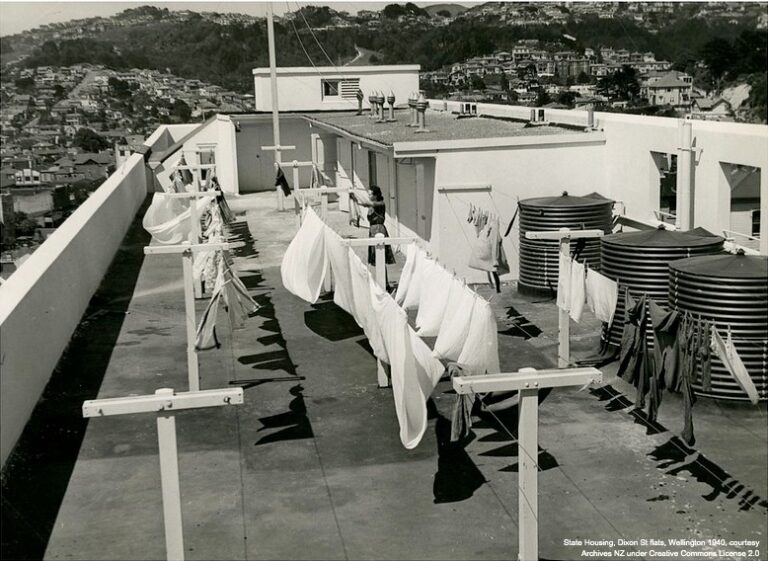
The 2021 special issue of the NZ Population Review released today may be considered something of a bible in the years to come by anyone serious about housing issues in Aotearoa.
Published by the Population Association of New Zealand (PANZ), the special issue comprises ten new papers by some of our weightiest names in housing research as well as critical new voices, providing the latest data, crucial historical context, and direct experiences of the current housing crisis.
It also includes analysis of how simplistic renditions of housing statistics in government briefings frequently distort how we see housing problems and their solutions in New Zealand. “We’re hoping that this special issue will help raise the level of public debate about the housing crisis” said co-editor Kay Saville-Smith, director of the Centre for Research, Evaluation & Social Assessment (CRESA).
The issue starts with comprehensive overview papers on housing policy and housing statistics in New Zealand, highlighting the interconnection between housing, population wellbeing, the political and policy processes that paved the way for New Zealand’s decline in home-ownership, as well as implications of population and housing change for Māori. Data analysis includes a comprehensive and user-friendly summary of the 2020 Chief Statistician’s report on housing outcomes, including homelessness, and the journey of New Zealand housing stock and its affordability since the 1990s.
With a growing proportion of New Zealanders renting, the issue then deep-dives into rental conditions and experiences. This includes findings from the latest Housing Condition Survey showing that “whether someone owns or rents has a profound impact on their housing conditions,” said Kay Saville-Smith.
More papers examine the precariousness and agency experienced by New Zealand’s swelling population of renters. “In one paper, reading about the struggles of young people in insecure housing truly saddened me”, said co-editor Grace Walker, based at the University of Otago, Christchurch. “The impact of insecure housing on people’s mental health and wellbeing can be so profoundly damaging.”
Many of the papers challenge preconceptions around Māori and housing. “Despite what previous authors have claimed, Māori cultural practices do not explain the decline of Māori owner occupation” said co-editor Grace Walker (Ngāti Kahungunu, Ngāruahine).
The issue is capped by a rigorous and sometimes critical review of Paul Spoonley’s book ‘New New Zealand’ by Professor Richard Bedford.
NZPR Vol 47 (2021): Housing at the heart of place, people and population
Philippa Howden-Chapman, Caroline Fyfe, Kim Nathan, Michael Keall, Lynn Riggs and Nevil Pierse
Understanding the State of our Housing: Housing in Aotearoa: 2020
Te Māramatanga ki te Tūnga o Ō Tātou Whare Noho: Ngā Whare Noho i Aotearoa: 2020
Rosemary Goodyear Alan Bentley, Vicki White, Claire Bretherton, Casimir MacGregor, Roman Jaques, David Dowdel, Jarred Butler, Angela Fabian, and Chelsea Dickson
An Exploration of the Māori Housing-Health Nexus During the Mid-Twentieth Century
He Hōpara I Te Raupapa Hononga I Waenga I Te Hauora Me Ngā Whare Noho O Te Māori I Te Pokapū O Te Rautau Rua Tekau
Matthew Rout and Grace Walker
The Condition of Owned and Rented Housing in Aotearoa New Zealand
Te Āhuatanga o ngā Whare Noho Whai Rangatira me ngā Whare Noho e Rētihia ana i Aotearoa
Vicki White, Alexandra Ferguson, Rosemary Goodyear, and Kay Saville-Smith
Sticky Rents and The Affordability of Rentals for Housing in New Zealand
Ngā Rēti Hāpiapia me te Whaiutu o ngā Whare Noho Rēti i Aotearoa
Alan Bentley
“It feels real good having my own space” – Young Māori Mothers in the E Hine Study Talk About Housing
“Ki a au nei he mea tino pai te whai whaitua mōku anō” – Ngā Whaea Māori Pūhou i roto i te Rangahau E Hine Kōrero Mō Te Whare Noho
Anna Adcock, Fiona Cram and Beverley Lawton
Evicting My Childhood: Young People’s Survival of Unstable Housing
Te Pana i Taku Ohinga: Tā Te Taiohi Puta Ora i ngā Kāinga Pāhekeheke
Louisa Choe
Pathways to Renting among Older Former Homeowners
Ngā Ara ki te Rēti Whare i waenga i te Hunga Mātāpuputu i Pupuri Whare i Mua
Beverley James, Tara Coleman, Fiona Cram, Laura Bates, Robin Kearns
Exploring the Factors Affecting Māori Home Ownership
Ngā Kaihanga, Ngā Noho, Ngā Tangata – Te Tūhurahura i ngā Āhuatanga Ka Pā ki Tā te Māori Hoko Whare
Jay Whitehead and Grace Walker
Statistical Representations of the Housing Problem in Briefings to Incoming Ministers, 2008–2020: The Politics of Housing Numbers
Ngā Whakaaturanga ā-Tauanga o te Raruraru Whare Noho i ngā Kupu Whakamārama ki ngā Minita Hou, 2008–2020: Ngā Take Tōrangapū mō te Maha o ngā Whare Noho
Patrick Barrett and Reuben Garrett-Walker
Book Review: ‘The New New Zealand: Facing Demographic Disruption’ by Paul Spoonley, Massey University Press (2020)
Richard Bedford
Obituary: David Christopher Thorns, 1943–2020, MA, Litt.D, ONZM, FRSNZ
Special Guest Editors: Kay Saville-Smith and Grace Walker Editors: Rosemary Goodyear and Bryndl Hohmann-Marriott
The Special Housing Issue in the news:
Radio NZ: Consequences of three decades of housing commodification
New Zealand Herald: Renting in Retirement: Divorce, financial shocks and illness revealed in new research
Stuff: Staying put in a rental can save you up to $110 per week, research finds
Image: Dixon Street Flats 1940, Wellington, courtesy Archives New Zealand under Creative Commons License 2.0.


